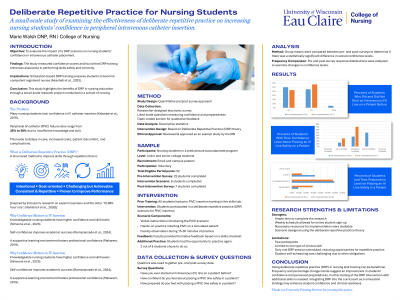Research
(79) Deliberate Repetitive Practice for Nursing Students
Thursday, June 19, 2025
5:00 PM - 6:30 PM MST
Location: Exhibit Hall

.jpg)
Marie Walsh, DNP, RN
Assistant Professor
University of Wisconsin Eau Claire
Arpin, Wisconsin, United States
Lead Author(s)
Abstract: Background
Nursing students are absent from confidence when placing a peripheral intravenous catheter (PIVC) in a patient. With this absence it can initiate alterations in nursing care, growth in patient dissatisfaction and risk of complications. There is a significant body of evidence that shows the importance of student confidence in PIVC insertion. The purpose of this study was to see if using a scenario to practice inserting a PIVC would change a student’s confidence encompassing this skill. The deliberate practice theory was used to see how intentional practice may or may not affect confidence levels in nursing students surrounding PIVC insertion.
Sample
The 22 participants were nursing students enrolled in a prelicensure bachelor’s nursing program at their Junior and Senior level.
Method
The intervention of using a deliberate repetitive practice (DRP) scenario with nursing students was to help them practice placing PIVC. The study used a mixed method research design. An electronic researcher designed Likert scale survey was sent to the students before and after the DRP scenario. This survey was able to capture the student's confidence before and after the intervention.
Results
Descriptive statistics were used to analyze these results. Students showed that they felt more confident inserting a PIVC. Twenty-two individuals completed the pre-survey, 14% were very confident and seven took the post-survey, 29% were very confident.
Conclusion
Utilizing a DRP scenario can be helpful with practicing skills. This type of intervention has been shown to increase student confidence with PIVC placement.
Please include a short summary of your presentation that highlights why an attendee would want to view your poster.: Student confidence increased after using a deliberate repetitive practice (DRP) scenario when placing a peripheral intravenous catheter (PIVC) in a patient.
Students showed that they felt more prepared with inserting a peripheral intravenous catheter (PIVC) after using the DRP intervention.
A small sample size was used for this pilot study.
Nursing students are absent from confidence when placing a peripheral intravenous catheter (PIVC) in a patient. With this absence it can initiate alterations in nursing care, growth in patient dissatisfaction and risk of complications. There is a significant body of evidence that shows the importance of student confidence in PIVC insertion. The purpose of this study was to see if using a scenario to practice inserting a PIVC would change a student’s confidence encompassing this skill. The deliberate practice theory was used to see how intentional practice may or may not affect confidence levels in nursing students surrounding PIVC insertion.
Sample
The 22 participants were nursing students enrolled in a prelicensure bachelor’s nursing program at their Junior and Senior level.
Method
The intervention of using a deliberate repetitive practice (DRP) scenario with nursing students was to help them practice placing PIVC. The study used a mixed method research design. An electronic researcher designed Likert scale survey was sent to the students before and after the DRP scenario. This survey was able to capture the student's confidence before and after the intervention.
Results
Descriptive statistics were used to analyze these results. Students showed that they felt more confident inserting a PIVC. Twenty-two individuals completed the pre-survey, 14% were very confident and seven took the post-survey, 29% were very confident.
Conclusion
Utilizing a DRP scenario can be helpful with practicing skills. This type of intervention has been shown to increase student confidence with PIVC placement.
Please include a short summary of your presentation that highlights why an attendee would want to view your poster.: Student confidence increased after using a deliberate repetitive practice (DRP) scenario when placing a peripheral intravenous catheter (PIVC) in a patient.
Students showed that they felt more prepared with inserting a peripheral intravenous catheter (PIVC) after using the DRP intervention.
A small sample size was used for this pilot study.
Learning Objectives:
- Upon completion, participants will be able to define deliberate repetitive practice (DRP).
- Upon completion, participants will be able to identify one challeng that facilitators experienced when using DRP to learn intravenous catheter insertion.
- Upon completion, participants will be able to consider potential areas for future research related to DRP and nursing education
